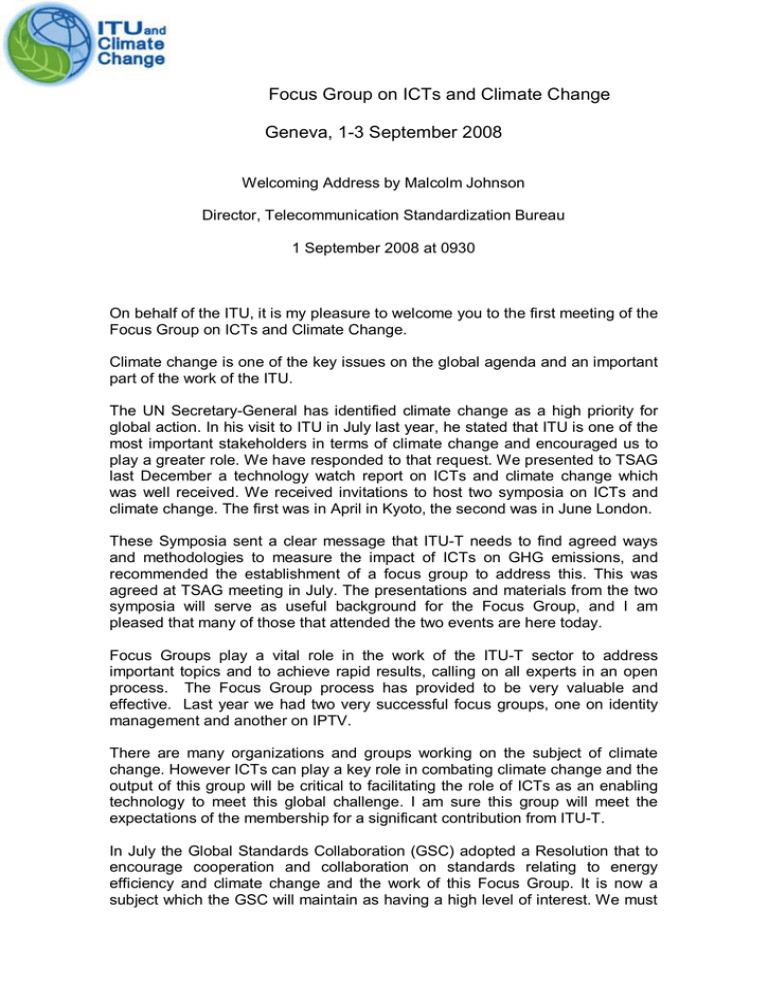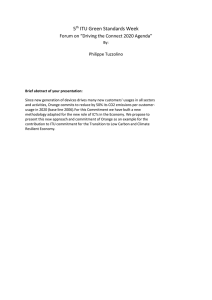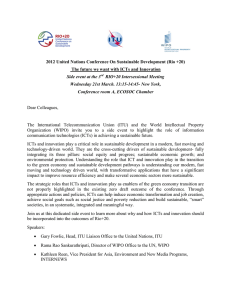Focus Group on ICTs and Climate Change Geneva, 13 September 2008
advertisement

Focus Group on ICTs and Climate Change Geneva, 1­3 September 2008 Welcoming Address by Malcolm Johnson Director, Telecommunication Standardization Bureau 1 September 2008 at 0930 On behalf of the ITU, it is my pleasure to welcome you to the first meeting of the Focus Group on ICTs and Climate Change. Climate change is one of the key issues on the global agenda and an important part of the work of the ITU. The UN Secretary­General has identified climate change as a high priority for global action. In his visit to ITU in July last year, he stated that ITU is one of the most important stakeholders in terms of climate change and encouraged us to play a greater role. We have responded to that request. We presented to TSAG last December a technology watch report on ICTs and climate change which was well received. We received invitations to host two symposia on ICTs and climate change. The first was in April in Kyoto, the second was in June London. These Symposia sent a clear message that ITU­T needs to find agreed ways and methodologies to measure the impact of ICTs on GHG emissions, and recommended the establishment of a focus group to address this. This was agreed at TSAG meeting in July. The presentations and materials from the two symposia will serve as useful background for the Focus Group, and I am pleased that many of those that attended the two events are here today. Focus Groups play a vital role in the work of the ITU­T sector to address important topics and to achieve rapid results, calling on all experts in an open process. The Focus Group process has provided to be very valuable and effective. Last year we had two very successful focus groups, one on identity management and another on IPTV. There are many organizations and groups working on the subject of climate change. However ICTs can play a key role in combating climate change and the output of this group will be critical to facilitating the role of ICTs as an enabling technology to meet this global challenge. I am sure this group will meet the expectations of the membership for a significant contribution from ITU­T. In July the Global Standards Collaboration (GSC) adopted a Resolution that to encourage cooperation and collaboration on standards relating to energy efficiency and climate change and the work of this Focus Group. It is now a subject which the GSC will maintain as having a high level of interest. We must W ELCOMING STATEMENT BY MALCOLM JOHNSON TO ITU­T FG CC&ICTS use this as a basis for the coordination of work on energy efficiency and systems engineering. Last week in Ghana, a UN meeting discussed the Bali Action Plan to achieve measurable, reportable and verifiable mitigation of emissions of Green House Gases (GHGs). 1 This relates directly to a key task of the Focus Group, namely to find agreed ways to measure, report and verify energy savings and reductions in GHG emissions through ICTs. Yesterday, here in Geneva, the Intergovernmental Panel on Climate Change (IPCC) celebrated its twentieth birthday and is meeting today to discuss the advances in our knowledge of the effects of greenhouse gases on the climate. Looking forward, In October ITU will hold the World Telecommunication Standardization Assembly in Johannesburg. The day before, speakers at the first­ever Global Symposium on Standardization will address the challenges of standardization of ICTs and climate change. WTSA will be an opportunity for Member States and Sector Members to express their views on the importance of the work on climate change, and a report on the activity of this group will be made. In November, ITU will convene a High Level Segment of the Council on climate change. ITU will also participate actively in the ongoing negotiations towards a new global agreement on climate change. The next major meeting is in Poland in December and the hope is to have a new agreement finalized in December 2009 in Denmark. ITU is committed to achieving its own climate neutrality in the near future. An energy audit has been conducted and an Action Plan is being developed. We will reduce our carbon footprint where we can and offset it where it is unavoidable. A presentation on this subject will be made on Wednesday. All our study groups are reviewing their recommendations to evaluate their energy efficiency. That work will, necessarily, take some time, but the savings made should be impressive. An important part of achieving climate neutrality is to bring work closer to our membership, rather than expecting them to come here to Geneva. This meeting is available for online participation and documents have been available on the web for some days. The slides will also be available on the web, as is an audiostream of the meeting. We need to increase our use of such technologies to set an example and make the best use of ICTs so that the work of the Group also serves to bridge the standards divide, by ensuring active participation from developing countries in our work. 1 http://unfccc.int/meetings/intersessional/accra/items/4437.php 2 W ELCOMING STATEMENT BY MALCOLM JOHNSON TO ITU­T FG CC&ICTS In closing, let me express my thanks to the very able and hard working Chairman and to the Vice­Chairmen in leading the work of the Focus Force. They have already been very active in preparing fot his meeting, and I am sure it will be a success. I wish you all a very fruitful and successful meeting. 3


